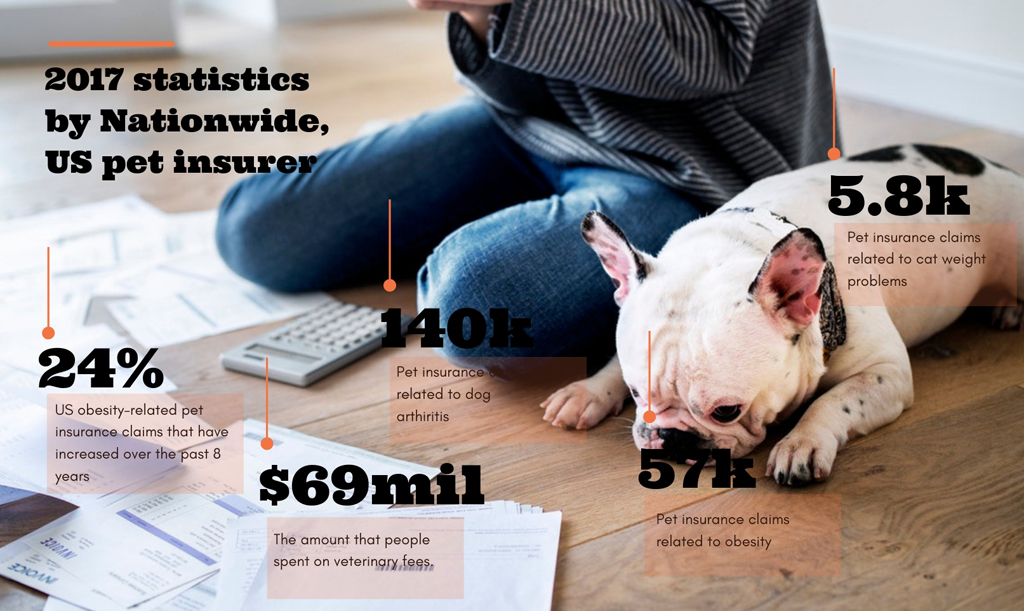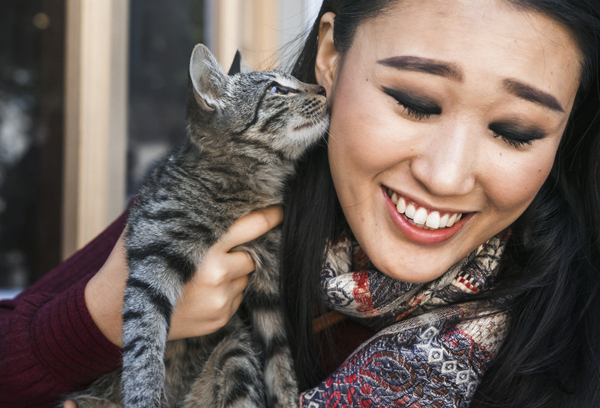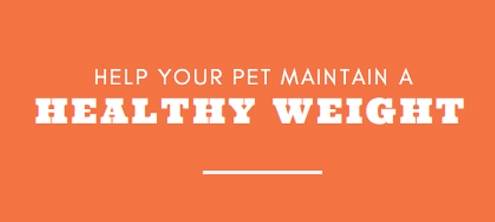IN THE KNOW

The most common obesity-related cat and dog insurance claims

It's interesting that weight gain in pets seems to mirror the explosion in human obesity. Maybe it's because we tend to treat our pets in the same way we treat ourselves, believing that what is good for us is also good for the animals we love. But being overweight is bad for your health, whether you're a human being or a fur baby.
Some people over-feed their pets because they love them so
much, and food symbolises that love. Some people feed their
cats and dogs too much, or too often, through ignorance or
because the animal is used to begging for treats at every
opportunity. Some owners feed their pets a terrible humanlike
diet of junk food. It might down to genetic changes.
Some pets just get fat all by themselves, and the cause
remains a mystery. Take cats. If you discover your cat has
been sneaking away to someone else's house every day to
beg for extra food, you are not alone! Plenty of cats do it.
No wonder today's pet insurers get so many claims for cat and dog obesity-related illnesses and health conditions. Here's some information about pet obesity, including the most common pet insurance claims according to PropertyCasualty360 and some bright ideas about stopping your own pet from piling on the pounds.
No wonder the US Pet Insurance market alone is set do double by 2022
The US pet insurer Nationwide says dog and cat obesity is rising for the 8th year in a row, which makes it more of a trend than a one-off. US obesity-related pet insurance claims have increased 24% over the past eight years. 2017 saw almost a fifth of Nationwide's 700,000 pet insurance customers making a claim related to pet obesity. In total these people spent more than $69 million in veterinary fees to put things right, an average of just under $100 each. No wonder the US pet insurance market alone is set to double by the year 2022.In Australia the RSPCA says dog obesity is fast becoming a serious issue. Dogs Today magazine in the UK reports that one in three British dog owners think their pet is overweight, and Mail Online says 45% of the UK's dogs and 40% of of UK cats are overweight.
An unpublished 2009 study in Korea revealed an obesity incidence rate of 21.3% for dogs and 10.2% for cats. And in Singapore during 2016 a report was published about a genetic mutation that makes some dog breeds get fatter than others, including the labrador and retriever. It looks like pet obesity really is a worldwide issue.

How can you tell if your fur baby has got too fat?
An obese dog is simply a dog that's obviously overweight. It's easy to tell. Like us, they look chubby. And the same goes for cats. In their natural, slim state a cat will have a 'waist' that you can see from above, a place where they probably weigh too much.How obesity affects our pets
As with people, excessive body fat in pets makes them a lot more likely to suffer from preventable health issues. Like us, being morbidly obese can shorten a dog or cat's life. And just like us, being overweight makes an animal feel sluggish and tired. Fat makes it harder for them to enjoy exercise and play. Fat is no fun for pets, and it makes them poorly.- Arthritis is one of the biggest reasons for a pet insurance claim, and it's made worse by obesity. During 2017 Nationwide alone received over 57,000 pet insurance claims for dog arthritis. The average claim was for US $323
- Nationwide had more than 5,800 pet insurance claims in 2017 for bladder
and urinary tract disease, which makes it the most common weight-related
problem for cats. The average claim amount was just under five hundred US
dollars.
- These very common weight-related problems are followed by spine immobility and spinal disc problems, gall bladder issues, heart failure, high blood pressure, arthritis, liver disease, asthma, diabetes, torn knee ligaments, low thyroid issues and chronic kidney disease
Finally – obesity can lead to refused pet insurance claims
It's your responsibility to look after your animal properly and keep them in good health. Did you know that some pet insurers are starting to turn down claims when pets are too fat? Other pet insurers are so concerned that they're offering pet owners incentives like doggie fitness trackers.As long as your beloved fur baby is in good health and a reasonable weight, we will probably be able to insure them for you. Just remember your insurance might not protect your finances properly if you let your pet get fat.

Remember your pet isn't a human. Human food isn't good for them – they need a specially formulated diet for dogs or cats, not your leftovers
Don't feed your pet scraps from the dinner table – it's a bad habit
Treats are things you have now and again, not all the time. Even a really big dog or cat only needs small treats
Buy the healthiest treats you can find – no junk food! Packaged dog and cat treats often contain sugar, fat and preservatives, all of which can mean poor health
Monitor the amount of food you provide, and always read the label to make sure you're not over-feeding
Every dog deserves at least two good walks a day, the exact right amount of exercise for their breed
To keep your cat slim, play with them as much as you can. Playing with your cat also reduces the time they spend hunting
If you think your pet's putting on weight, see the vet in case there's a health issue behind the weight gain. Your vet will also be able to help with good advice about diet and exercise
SOURCES
- https://www.propertycasualty360.com/2019/01/04/top-10-most-common-obesity-related-cat-dog-pet-ins
- https://www.rspcapetinsurance.org.au/pet-care/health/dogs-and-obesity
- https://dogstodaymagazine.co.uk/2018/08/20/1-in-3-pet-owners-think-their-pet-is-overweight
- https://www.dailymail.co.uk/news/article-5640643/Owners-urged-watch-pets-weight-insurers-refuse-pay-treatment-fat-animals.html
- https://www.vin.com/apputil/content/defaultadv1.aspx?id=5124315&pid=11343&
- https://www.straitstimes.com/singapore/science-briefs-canine-obesity
Posted on 3 March, 2019 Reading times 7:00 mins